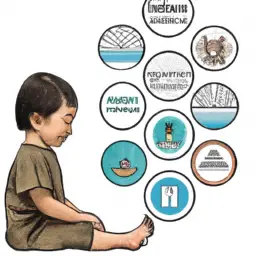Are you struggling to reach your full potential? Do you often feel like you’re not making the most of your time? Developing grit and improving time management skills can help you unlock your potential and achieve your goals.
Grit is the ability to persevere through challenges and setbacks, while time management is the art of using your time effectively to accomplish what you need to do. By combining these two skills, you can become more productive, focused, and successful.
In this article, we’ll explore 10 steps you can take to develop grit and improve your time management skills. You’ll learn how to cultivate resilience and mental toughness, set goals and prioritize tasks, create a productive work environment, plan your time effectively, and stay accountable.
Whether you’re a student, a professional, or just someone looking to make the most of your time, these tips will help you unlock your potential and achieve your dreams. So, let’s get started!
Key Takeaways
- Developing grit and time management skills can increase productivity and success.
- Overcoming procrastination and breaking down tasks can make them more manageable.
- Prioritizing tasks based on importance and urgency using tools like the Eisenhower matrix and time blocking can help manage time effectively.
- Staying accountable, adaptable, and focused on the big picture while tracking progress and celebrating successes can boost motivation and lead to achieving goals.
Understanding the Importance of Grit and Time Management
Don’t underestimate the power of grit and time management – they can make all the difference in achieving your goals and becoming the best version of yourself. Improving self-discipline is crucial to developing grit, which is the ability to persevere through challenges and setbacks. Without grit, it’s easy to give up when faced with difficulties, and that’s why it’s essential to cultivate it.
You can start by setting small goals for yourself and working towards them consistently. As you achieve these goals, you’ll build confidence in your ability to overcome obstacles and develop the resilience needed to keep pushing forward.
Another crucial aspect of unlocking your potential is overcoming procrastination. It’s easy to get distracted by social media, TV shows, or other activities that don’t contribute to your growth. However, by managing your time effectively, you can avoid procrastination and focus on the tasks that matter.
One effective method is to break down larger tasks into smaller, more manageable ones. This approach makes it easier to get started and stay motivated, as you can see progress with each completed task. By prioritizing your time and staying focused, you’ll be well on your way to unlocking your potential and achieving your goals.
Cultivating Resilience and Mental Toughness
Building resilience and mental toughness is essential for achieving success in any area of life. These traits allow you to bounce back from setbacks, stay focused on your goals, and push through difficult challenges. Fortunately, developing resilience and building mental toughness is something that anyone can work on with the right mindset and habits.
Here are five ways to cultivate these important qualities:
-
Embrace discomfort: To build mental toughness, you need to push yourself out of your comfort zone regularly. This might mean trying new things, taking on challenging projects, or pushing yourself physically with exercise.
-
Adopt a growth mindset: People with mental toughness see challenges as opportunities for growth and improvement. By adopting a growth mindset, you can train yourself to approach difficulties with a positive attitude and a focus on learning.
-
Practice gratitude: Gratitude is a powerful tool for building resilience. When you focus on what you’re grateful for, you develop a sense of perspective and resilience that can help you weather any storm.
-
Build a support network: Surrounding yourself with supportive people can help you stay resilient and mentally tough. Seek out friends, family, or colleagues who inspire and motivate you, and lean on them when you need a boost.
-
Learn from failure: Failure is an inevitable part of life, but it can also be a valuable learning opportunity. By reflecting on your failures and using them as a chance to grow and improve, you can build resilience and mental toughness that will serve you well in the long run.
By incorporating these habits into your daily routine, you can develop the resilience and mental toughness you need to achieve your goals and thrive in any situation. Remember, building these qualities takes time and effort, but the payoff is well worth it.
Setting Goals and Prioritizing Tasks
By setting clear SMART goals and prioritizing tasks using the Eisenhower matrix, we can create a roadmap towards achieving our desired outcomes.
SMART goals are specific, measurable, attainable, relevant, and time-bound. They help us focus on what we want to achieve and how we will measure success.
The Eisenhower matrix helps us prioritize tasks by categorizing them into four quadrants: urgent and important, not urgent but important, urgent but not important, and not urgent and not important. By doing this, we can focus on what is truly important and avoid wasting time on tasks that don’t contribute to our goals.
Once we have set our goals and prioritized our tasks, we can use time blocking and the Pomodoro technique to manage our time effectively.
Time blocking involves scheduling specific blocks of time for different tasks, which helps us avoid multitasking and stay focused on what we need to accomplish. The Pomodoro technique involves breaking tasks into 25-minute intervals, followed by a 5-minute break. This helps us stay focused and avoid burnout, as well as ensuring that we are making progress towards our goals.
By incorporating these strategies into our daily routine, we can improve our time management skills and achieve the success we desire.
Creating a Productive Work Environment
When it comes to creating a productive work environment, there are three key points to keep in mind.
First, eliminate distractions and find ways to remove them from your workspace.
Second, stay focused on the task at hand.
Finally, keep your motivation levels high to ensure you stay productive throughout the day.
You need to be aware of the things that can distract you, such as social media, email notifications, or noisy coworkers.
Once you’ve identified these distractions, take steps to remove them, such as turning off notifications, using noise-cancelling headphones, or finding a quieter workspace.
Staying focused is crucial to maintaining productivity. One way to do this is by breaking tasks into smaller, more manageable chunks.
Another helpful technique is to use the Pomodoro method, which involves working for 25 minutes, then taking a short break before starting the next 25-minute session.
Finally, staying motivated is key to maintaining productivity throughout the day.
Find ways to keep yourself motivated, such as setting achievable goals, rewarding yourself for completing tasks, or taking breaks to recharge your energy.
Eliminating Distractions
You’ll get easily distracted if your phone buzzes with notifications every few minutes, so put it on silent and out of sight to stay focused on the task at hand. Eliminating distractions is crucial in improving your time management skills and developing grit. Techniques and tools can help you create a distraction-free zone that allows you to concentrate on your work without getting sidetracked.
To start, try using a time tracking app to monitor how much time you spend on different tasks. This will help you identify which activities take up most of your time and which ones you can eliminate or delegate. You can also use noise-cancelling headphones to block out external sounds, or a website blocker to prevent you from accessing distracting websites. Creating a schedule and prioritizing your tasks can also help you stay on track and avoid getting distracted. Remember, the key is to find what works for you and stick to it, so experiment with different techniques and tools until you find the ones that help you stay focused and productive.
| Distraction | Technique/Tool | Benefits | ||||
|---|---|---|---|---|---|---|
| Phone notifications | Put phone on silent and out of sight | Avoid interruptions and stay focused | ||||
| External sounds | Noise-cancelling headphones | Block out distractions and improve concentration | ||||
| Distracting websites | Website blocker | Prevent access to non-work related sites | ||||
| Time-wasting activities | Time tracking app | Identify time-consuming tasks and eliminate or delegate | ||||
| Disorganization | Schedule and prioritize tasks | Stay on track and avoid getting sidetracked | Lack of focus | Use productivity techniques | Such as the Pomodoro method or mindfulness exercises to improve concentration |
Staying Focused and Motivated
Staying focused and motivated can be challenging, but it’s essential for achieving your goals. Building discipline is one way to stay on track. This means creating a routine and sticking to it, even when you don’t feel like it.
It may be tough at first, but with practice, discipline becomes a habit that helps you stay focused and motivated. Another way to stay focused and motivated is to overcome procrastination.
This can be done by setting deadlines for yourself, breaking your work into smaller tasks, and rewarding yourself for completing each task. It’s also important to eliminate distractions, such as social media and television, during work hours.
By building discipline and overcoming procrastination, you can stay focused and motivated, and successfully achieve your goals.
Planning Your Time Effectively
Effective time planning involves prioritizing tasks and breaking them down into manageable chunks. Creating schedules is a great way to ensure that you’re making the most of your time.
Start by listing all the tasks you need to complete and then prioritize them based on their importance and urgency. Once you have a clear idea of what needs to be done, create a schedule that includes specific times for each task. This will help you stay on track and avoid wasting time on unimportant tasks.
Another important aspect of effective time planning is avoiding procrastination. It’s easy to get distracted by social media, emails, or other non-essential tasks, but this can lead to wasted time and missed deadlines.
To avoid procrastination, try breaking down larger tasks into smaller, more manageable chunks. This will make it easier to get started and help you stay focused on the task at hand. Additionally, try to eliminate any distractions that may be hindering your productivity, such as turning off your phone or finding a quiet workspace.
By prioritizing tasks and avoiding procrastination, you can make the most of your time and achieve your goals.
Staying Accountable and Adapting to Changes
Now that you’ve learned how to plan your time effectively, it’s important to stay accountable and adapt to changes.
This means tracking your progress and celebrating your successes along the way. It also means being open to adjusting your goals and strategies when needed to ensure that you stay on track towards achieving your ultimate objective.
Tracking Progress and Celebrating Successes
By keeping track of your progress and taking time to celebrate your successes, you can boost your motivation and continue to develop grit and improve your time management skills.
One effective way to track progress and celebrate successes is by developing a reward system. Set small goals for yourself and determine a reward for each milestone you reach. This could be something as simple as treating yourself to a favorite snack or taking a break to watch an episode of your favorite show. By celebrating these small wins, you will feel more motivated to continue working towards your larger goals.
Another way to track progress and celebrate successes is by sharing updates with others. This could be with a friend, family member, or accountability partner. Having someone to share your successes with can make the journey feel less lonely and help keep you motivated.
Additionally, hearing positive feedback and encouragement from others can boost your confidence and help you stay on track. So, don’t be afraid to share your progress updates and celebrate your successes with others.
Adjusting Goals and Strategies When Needed
It’s important to be flexible with your goals and strategies and make adjustments when necessary in order to continue making progress towards your desired outcome. Sometimes, even the best-laid plans can go awry due to unforeseen circumstances or unexpected roadblocks. When this happens, it’s crucial to be adaptable and willing to shift gears in order to stay on track.
Here are three tips for adjusting goals and strategies when needed:
-
Evaluate your progress: Take a step back and assess how far you’ve come and what’s been working well. Identify any areas where you’ve been struggling or falling short and brainstorm new approaches to overcome these challenges.
-
Be open to feedback: Seek out constructive criticism from trusted sources, such as mentors or colleagues, and use their insights to refine your approach.
-
Stay focused on the big picture: Remember why you set your goals in the first place and keep your eye on the prize. Be willing to pivot your strategy if needed, but don’t lose sight of your ultimate objective.
By staying flexible and adaptable, you can overcome obstacles and achieve success.
Frequently Asked Questions
Can grit and time management skills be developed at any age or is it only effective if learned during childhood?
Yes, grit and time management skills can be developed at any age. In fact, there are benefits of late blooming when it comes to developing grit later in life.
As you age, you gain more life experiences and wisdom, which can help you develop the perseverance and passion needed to cultivate grit. However, as you get older, you may also face challenges when it comes to adapting to an aging brain and overcoming time management challenges.
It’s important to be aware of these challenges and find strategies to work around them, such as breaking tasks into smaller chunks or utilizing tools like calendars and reminders. With dedication and persistence, you can develop grit and improve your time management skills at any age.
How do you handle unexpected interruptions or emergencies that disrupt your planned schedule?
When dealing with interruptions or emergencies that disrupt your planned schedule, it’s important to stay calm and prioritize tasks.
Assess the situation and determine what needs to be addressed immediately and what can wait.
If possible, communicate with others involved and delegate tasks to lighten the load.
Remember to be flexible and adjust your schedule accordingly.
It’s also helpful to have a contingency plan in place for unexpected events.
By staying organized and focused, you can effectively handle interruptions and minimize their impact on your productivity.
Is it necessary to completely eliminate all distractions in order to improve time management and productivity?
When it comes to balancing distractions and improving productivity, it’s not always necessary to completely eliminate all distractions. In fact, some distractions can actually be helpful for creativity and problem-solving.
However, it’s important to prioritize tasks and limit the amount of time spent on distractions. Embracing multitasking can also be helpful, as long as it doesn’t lead to a loss of focus and reduced productivity.
Ultimately, finding the right balance between embracing distractions and focusing attention is key to improving time management and achieving your goals.
How do you determine the appropriate amount of time to spend on a task before moving on to the next one?
Task prioritization and multitasking efficiency are crucial when managing your time effectively. One way to determine the appropriate amount of time to spend on a task is to break it down into smaller, more manageable parts. Set specific goals and deadlines for each part to ensure you stay on track.
It’s also important to prioritize tasks based on their level of importance and urgency. By focusing on the most critical tasks first, you can ensure that you’re making progress towards your goals and not wasting time on less important tasks.
Additionally, multitasking may seem like a good way to get more done in less time, but it can actually be counterproductive. Instead, try focusing on one task at a time and giving it your full attention before moving on to the next one. This can help you work more efficiently and achieve better results in the long run.
What are some effective strategies for overcoming procrastination and avoiding burnout?
When it comes to overcoming procrastination and avoiding burnout, there are a few strategies that can be effective.
One approach is to break down tasks into smaller, more manageable pieces so that they don’t seem as overwhelming.
You can also prioritize your work, focusing on the most important tasks first and then tackling the rest in order of their importance.
Another helpful strategy is to take breaks throughout the day to recharge and prevent burnout.
By using these tactics, you can stay focused and motivated, while also avoiding the negative effects of procrastination and burnout.
Conclusion
So there you have it – by developing grit and improving your time management skills, you can unlock your full potential and achieve your goals.
Remember that cultivating resilience and mental toughness is key, as is setting clear goals and prioritizing tasks. Creating a productive work environment can help you stay focused and motivated, while planning your time effectively and staying accountable can ensure that you make the most of your available hours.
Finally, don’t forget to be adaptable and flexible in the face of changes and challenges. By following these 10 steps, you can develop the skills and mindset you need to succeed in any area of your life.
So what’re you waiting for? Start taking action today and unlock your true potential!















































































































